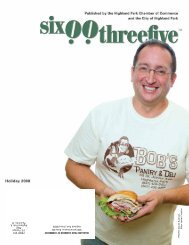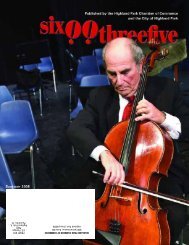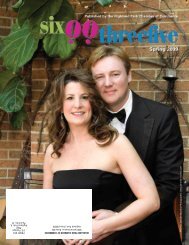PHOTOS: Matt Boltz, Engineer, Chicago Cubs Radio - Wordspecs
PHOTOS: Matt Boltz, Engineer, Chicago Cubs Radio - Wordspecs
PHOTOS: Matt Boltz, Engineer, Chicago Cubs Radio - Wordspecs
Create successful ePaper yourself
Turn your PDF publications into a flip-book with our unique Google optimized e-Paper software.
Animal control responsibilities also fall to CSOs, Morris says, with three<br />
of them trained to handle calls about feral cats, nuisance dogs and wild<br />
animals like skunks, raccoons, rabbits and deer. They trap the animals or<br />
provide traps to homeowners.<br />
CSOs also are Crime Scene Investigators, or CSIs. They work crime<br />
scenes, collecting evidence, taking photos and creating the evidence packages<br />
that support the department’s investigators. Collections may include trace<br />
evidence and toxicology, DNA, fingerprints and computer contents. Evidence<br />
Morris and his partners gather is carefully tracked from crime scene to crime<br />
lab, entered on an evidence cataloguing system they refer to as “The Beast”<br />
and sent to a forensic facility in Vernon Hills for testing.<br />
The nationally accredited Northern Illinois Police Crime Laboratory<br />
serves 40 municipalities from Lincolnwood and Skokie to McHenry County.<br />
Founded in 1968, it is fast, versatile and considered one of the best in the<br />
country. In addition to working with material from crime scenes, the lab<br />
can analyze unknown substances, providing reassurance or direction in the<br />
case of possible terrorist attack.<br />
Morris has been a full-time CSO for four years. The son of an officer<br />
who served as a Cook County Sheriff’s deputy, he emphasizes the service<br />
aspect of his title, saying that even parking enforcement—the most visible<br />
and sometimes confrontational part of his work—is about education. “We<br />
try to teach people the reasons for the rules. Parking for too long makes<br />
area businesses less accessible, and parking poorly can cause accidents. We<br />
would rather inform than issue a ticket.”<br />
The outreach of community<br />
policing is central to Thomas<br />
Spanos’ idea of law enforcement.<br />
As the HPPD’s business liaison<br />
officer, he meets with owners<br />
and employees to discuss<br />
financial crimes, collecting bad<br />
checks, where to position cash<br />
registers, preventing shoplifting<br />
and what to do in case of a<br />
robbery. “Witnesses often<br />
disagree on details. Seeing a<br />
crime is a shock; a bit of<br />
confusion is typical. People may<br />
confuse what a robber was<br />
wearing with the clothing of people in the background.” One suggestion for<br />
crime witnesses: Don’t discuss what you saw before you talk to the police.<br />
That way, you can provide information untainted by another’s impressions.<br />
He is now developing programs on how to build observational skills.<br />
According to Spanos, the HPPD has always been open to ideas for<br />
community outreach. One program he developed, triggered by deadly auto<br />
accidents involving teens driving drunk: “Parents Who Host Lose the<br />
Most.” Picking up the motto from the Drug-Free Action Alliance in Ohio,<br />
he and the department set up a party tip line (847-926-1756) to permit<br />
anonymous submission of information about underage drinking.<br />
“We wanted parents to know that it’s a crime to provide alcohol to<br />
minors. We were the first department in Illinois with such a program, and<br />
other municipalities want to know what we’ve done. We put up signs all<br />
over the city and prepared flyers that Sam’s Wines and Spirits, Binny’s and<br />
restaurateurs could distribute with purchases and deliveries. They’ve asked<br />
for more.”<br />
Spanos also serves as a shooting range officer and an evidence<br />
technician. He’s on Highland Park’s SWAT (Special Weapons and Tactics)<br />
and recruitment teams and is an organizer of an Elderly Service Team to<br />
develop procedures for working with seniors.<br />
Spanos’ father was a police commander in <strong>Chicago</strong>, and his brother is<br />
an officer there. Before signing on in Highland Park, Spanos served with the<br />
<strong>Chicago</strong> Department of Aviation police at O’Hare Airport for two years.<br />
He spends substantial time on the street, visiting stores, banks and other<br />
businesses around the city, offering support and exemplifying his belief that<br />
a visible police presence is preventive. “Stopping crimes is better than<br />
making an arrest,” he says. “Having officers out there tells everyone<br />
Highland Park is on the ball.”<br />
When it comes to enhanced community contact—getting out of the car<br />
and onto the streets—Patrolman Richard Rash has been a leader. The 16-<br />
year veteran of the department has been a member of the bicycle patrol<br />
unit since 1996. “When I’m on my bike, I’m never more than four blocks<br />
from my car. If there’s a call, I<br />
can ride back, hang up my<br />
bike and drive where I’m<br />
needed.”<br />
Today’s patrol car is a<br />
traveling office. “We have<br />
laptops and phones. Dispatch<br />
reaches us by computer, and<br />
we file our reports<br />
electronically.”<br />
Rash, whose father was a<br />
HPPD officer (he retired about<br />
the time Rash came on board)<br />
has served as a field training<br />
officer and a member of the<br />
fire investigation unit since 1999 and on the evidence team for two years.<br />
HPPD officers answer about 30,000 calls a year, Rash says: burglaries,<br />
civil disturbances (“We seek to calm everyone down”), accidents and<br />
animal problems are the most frequent. Residential alarms can also be a<br />
problem, with many false alarms, particularly around breakfast time.<br />
One incident stands out in his mind: “A Waukegan couple, returning from<br />
a night in <strong>Chicago</strong>, were followed by two guys. When the couple stopped at<br />
Denny’s in Highland Park, these armed robbers took their money and headed<br />
south on Edens. The car was ID’d, and I chased them, picking up a state<br />
trooper at Tower Road. They exited at Cicero, taking evasive action at speeds<br />
up to 100 miles an hour. They ended up in a South Side alley on the South<br />
Side and fled on foot. We caught the driver right away and the passenger later<br />
in a drug house. We also found the weapon, back near Tower.”<br />
Of course, it’s the nature of dispatch calls to be an unpredictable business,<br />
says Communications Supervisor Jason Kern. Highland Park’s dispatchers<br />
(continued on next page)<br />
Fall 2007 / 13










